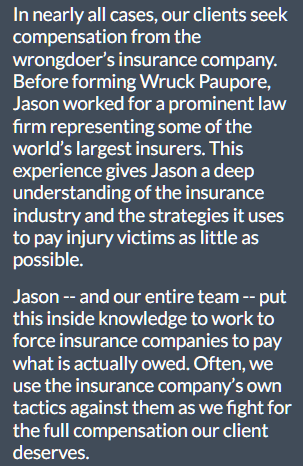




Spinal cord injuries are often regarded as one of the most devastating kinds of injuries a person might experience. Not only are they extremely painful, but they may come with a myriad of complications that can impact a person's quality of life forever. Exactly what your legal claims regarding such an injury are worth might be based on how an insurance company evaluates your injury.
Insurance companies handle claims individually, and your spine injury may be evaluated in light of your unique circumstances. Insurance companies may consider the costs of current and future medical care, the toll of medical complications, and non-economic injuries like pain and suffering. Generally, more serious injuries warrant greater compensation. However, insurance companies often try to pay far less than the policy limit allows. In fact, insurance companies are known for trying to reduce compensation by any means possible. One way they do this is by using contributory or comparative negligence rules to pin blame on injured victims. If you run into a problem like this, an attorney can help you.
For a free, confidential case evaluation, call our personal injury attorneys with Wruck Paupore at (219) 322-1166.
A spinal cord injury can be catastrophic, and victims often deal with the fallout of such an injury for a long time. Some people live with the consequences of a spine injury for the rest of their lives. Even so, no two cases are the same, and an insurance company will evaluate your case based on your specific situation.
Medical costs are one of the biggest factors insurance companies use to evaluate a spine injury. A spine injury is incredibly serious. Most people who experience this kind of injury incur steep medical bills. Not only might someone need emergency care, which can be costly, but they might need ongoing medical care for weeks, months, or even years after the initial injury. Our personal injury attorneys can help you make sure the insurance company considers your future costs when evaluating your injuries.
The insurance company may also consider any medical complications you experience and how they affect you. A serious complication might lead to more medical bills and additional costs. For example, if your spine injury leaves you permanently paralyzed and unable to walk, you might have to spend money on mobility aids, wheelchairs, physical therapy, and more. You might have to spend even more money to make your home wheelchair accessible.
While pain, suffering, and overall quality of life are not necessarily directly linked to financial costs, insurance companies might still consider them. These non-economic injuries tend to be subjective by nature, making them difficult to evaluate. Even so, if your injuries come with intense pain, serious psychological injuries and trauma, and an articulable and significant reduction in your quality of life, an insurance company might be more inclined to pay more compensation.
Unfortunately, insurance companies generally try to downplay non-economic injuries and damages. Sometimes, they do not cover them at all. Check your insurance policy with your attorney. If certain non-economic damages are included in your policy, you may be compensated for them.
When filing an insurance claim for a spinal cord injury, we must be prepared to push back if the insurance company tries to reduce your compensation. One common tactic is to find ways to blame the claimant for their injury. Insurance companies typically adhere to contributory or comparative negligence laws in whatever state you live in.
In states that follow rules of pure contributory negligence, injured victims seeking compensation may be completely barred from recovering damages if they contributed to the accident even slightly. This harsh rule has largely fallen out of favor, but a handful of states still use it. Other states follow pure comparative negligence rules, which allow injured victims to recover damages if they are partially to blame. However, the victim’s damages may be reduced in proportion to their share of blame.
A more common rule found in many states is modified comparative negligence. For example, Indiana follows a modified comparative negligence rule under I.C. § 34-51-2-5. According to this rule, an injured person may recover damages even if they are partially to blame for their injuries, and their damages are reduced in proportion to their responsibility. However, under § 34-51-2-6, if an injured person is more than 50% responsible, they may be barred from recovering anything.
Insurance companies are unlikely even to consider your spinal injury if you do not have evidence. Since spine injuries tend to be very serious and complicated, the insurance company will likely want to see details from your medical records. Your medical records may show the insurance company the true extent of your injury and overall diagnosis. Your records might also indicate the costs of treatment, which the insurance company needs to know to cover those damages.
Sometimes, a statement or affidavit from a medical expert might be necessary. In extreme cases involving debilitating injuries and long-term complications, insurance companies might want more evidence and assurance that your injuries are as costly as you claim. Your doctor or another medical expert familiar with injuries like yours may be able to submit an affidavit or statement about your condition to the insurance company.
We should also consider gathering statements or affidavits from yourself and witnesses. Where and how did your injuries happen? Who is responsible? How has the injury affected you? These are all questions that either you or witnesses can answer.
We should also try to find some evidence of the accident itself. Photos, videos, and even physical objects might help establish that the accident and your injuries are real and severe. We must show the insurance company that your accidents and injuries are real. Insurance companies often want to know if a claim is valid or fraudulent before they even begin processing it.
For a free, confidential case evaluation, call our personal injury attorneys with Wruck Paupore at (219) 322-1166.
Don is a founding partner and one of the nation’s top-ranked personal injury litigators. He is a member of the Multi-million Dollar Advocates Forum, which includes less than 1% of the nation’s trial lawyers, and awarded the highest ranking given by Martindale Hubbel and AVVO.
More importantly, Don understands representing personal injury victims is about more than recovering the best settlement: it’s about helping clients get back on their feet and supporting them in every aspect of their recovery.

In nearly all cases, our clients seek compensation from the wrongdoer’s insurance company. Before forming Wruck Paupore, Jason worked for a prominent law firm representing some of the world’s largest insurers. This experience gives Jason a deep understanding of the insurance industry and the strategies it uses to pay injury victims as little as possible.
Jason -- and our entire team -- put this inside knowledge to work to force insurance companies to pay what is actually owed. Often, we use the insurance company’s own tactics against them as we fight for the full compensation our client deserves.

For more than four decades, Keith has been fighting for injury victims. During that time, he’s watched the insurance industry change, with insurers now more interested in protecting their stock price than treating injury victims fairly.
Since the beginning, Keith has put people first. From his childhood in Gary, Indiana during the 1960’s and working his way through law school, Keith has risen to become one of the Midwest’s most respected trial lawyers. He has never forgotten that being a lawyer is about helping people -- and seeing injury victims through struggles in a way that could change their lives forever.
Over the decades, Keith, Don and Jason have fought relentlessly for clients, even when other lawyers have said the case was impossible to win.


© 2025
Terms of Service | Privacy Policy | Resources | Blog | Sitemap

© 2022 Wruck Paupore PC
Terms of Service | Privacy Policy